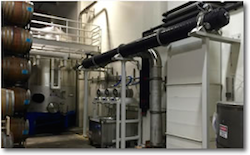 Genomatica and Braskem announced they have been successfully producing butadiene at lab scale since June 2015, using their direct, bio-based process. The companies are jointly developing a commercial process for the on-purpose production of butadiene made from renewable feedstocks, as announced in December 2013.
Genomatica and Braskem announced they have been successfully producing butadiene at lab scale since June 2015, using their direct, bio-based process. The companies are jointly developing a commercial process for the on-purpose production of butadiene made from renewable feedstocks, as announced in December 2013.- The National Alternative Fuels Training Consortium (NAFTC), a program of West Virginia University, won three MarCom Awards in the 2015 international awards competition – one platinum, one gold, and one honorable mention. MarCom Awards is an international creative competition that recognizes outstanding achievement by marketing and communication professionals.
- U.S. Energy Secretary Ernest Moniz has announced $125 million across 41 cutting-edge energy technologies awarded by the Department of Energy’s (DOE) Advanced Research Projects Agency-Energy (ARPA-E). These new projects are funded under ARPA-E’s OPEN 2015 program and come in advance of the COP21 U.N. Climate Negotiations in Paris next week. The announcement was made at D.C. technology incubator 1776 at an event that focused on leveraging America’s top innovators to find technological solutions to combat climate change, enhance security and solve pressing energy challenges around the globe.
- According to a new report from GTM Research and SoliChamba Consulting, Megawatt-Scale PV O&M and Asset Management 2015-2020: Services, Markets and Competitors, the global market for utility-scale PV operations and maintenance will reach 390 gigawatts by 2020, almost triple the estimated 133 gigawatts by the end of 2015.

Heating Oil Assoc. Helps Teach About Biodiesel
 The Big Apple is getting a little smarter on biodiesel heating oil. The New York Oil Heating Association (NYOHA) says it’s helped a Bronx teacher get Bioheat into his HVAC training.
The Big Apple is getting a little smarter on biodiesel heating oil. The New York Oil Heating Association (NYOHA) says it’s helped a Bronx teacher get Bioheat into his HVAC training.
Peter Gonzalez is teaching the science of Bioheat® fuel – as well as math, chemistry and English – to 17 Bronx Design and Construction Academy juniors this fall, with NYOHA’s support. In addition to arranging for 150 gallons of pure B100 Bioheat® fuel and equipment to be donated by AMERIgreen Energy and Schildwachter Oil Company, Rocco Lacertosa, NYOHA’s CEO and a member of the school’s HVAC Advisory Board, recently visited the classroom to speak directly to the students.
“New York City has mandated a 2 percent biodiesel blend, and one of the things I’m trying to do is educate the students on Bioheat® fuel and the importance of the industry going green,” Gonzalez said.
During the classroom session, NYOHA helped the students gain insider views of the Bioheat® fuel industry. Lacertosa spoke about work opportunities in Bioheat® fuel companies, and AMERIgreen Energy’s Michael Devine provided an in-depth look at the environmental benefits of Bioheat® fuel as well as the fuel’s appeal to consumers. Peter Schildwachter, of Schildwachter Oil Company, also visited the class and donated new equipment.
“We are very proud to support the excellent work that Peter Gonzalez is doing to help prepare New York City students for a future in the Bioheat® fuel industry,” said Lacertosa.
Gonzalez has devised a curriculum of exploration in which his HVAC class learns through experimentation and reporting. The students are blending small quantities of heating oil and biodiesel and paying careful attention to the blend ratios. They burn various Bioheat® fuel blends up to 99 percent biodiesel in heating equipment and use combustion analysis tools to profile the emissions at each level.
New Exec Committee at Nat’l Biodiesel Foundation
 There’s a new Executive Committee for the National Biodiesel Foundation. This news release from the National Biodiesel Board (NBB) said the group was elected during the NBB’s recent fall directors meeting in Washington, D.C., and the foundation is designed to advanced initiatives important to the commercial biodiesel industry.
There’s a new Executive Committee for the National Biodiesel Foundation. This news release from the National Biodiesel Board (NBB) said the group was elected during the NBB’s recent fall directors meeting in Washington, D.C., and the foundation is designed to advanced initiatives important to the commercial biodiesel industry.
Industry representatives elected to the board include:
– President: Mike Cunningham is currently a director on the American Soybean Association Board, representing the state of Illinois. Mike is a corn and soybean farmer from Bismark, Illinois. He has been involved with soybean association work at both the state and national level since 2002.
– Vice President: Mark Caspers is currently serving as a director on the United Soybean Board and recently completed a 12 year stint as a director on the Nebraska Soybean Board. He is a fourth generation family farmer operating a diversified crop operation on 600 acres in southeast Nebraska.
– Secretary/Treasurer: Jeff Lynn is from Oakford, Illinois and is a director for the Illinois Soybean Association as well as a trustee for Chandlerville Township in Cass County, Illinois. He is part of a family farm dating back to 1833 that includes corn, soybeans, and seed soybeans.
John Heisdorffer, Matt Jaeger, and David Womack retired their executive committee positions but will continue to serve on the Foundation board.
“We thank them for their dedication to the Foundation and biodiesel education and research over the years,” NBF Executive Director Tom Verry noted. “Their efforts have significantly impacted the growth of this industry.”
Growth Energy Intros ‘Bachelor’ Chris Soules RFS Ad
During a press call this morning, Growth Energy launched a week-long TV ad campaign featuring Iowa Farmer Chris Soules of “The Bachelor” and “Dancing with the Stars” fame. The ad focuses on the economic benefits of ethanol and the Renewable Fuel Standard (RFS) in rural America. The spot hits airwaves just days before the Obama Administration is due to announce its final rule on the RFS. The ad is airing in Iowa, Illinois, Ohio, and Indiana.
“I’m proud to be a part of something that protects something important to my family farm operation as well as thousands of others,” said Soules about why he became involved in efforts around promoting the positive benefits of the RFS. “I’ve been able to see first-hand the benefits of renewable fuels and how they affect my family’s enterprise and other families who haven’t even been involved in farming by providing jobs in clean energy that helps our country diversify our energy resources.”
Soules noted that in light of the recent events in Paris, it re-emphases the need for the U.S. to become energy independent with a diversified energy portfolio.
Soules was joined on the call by Tom Buis, co-chair of Growth Energy who noted that the RFS is a great American success story.
“We know our opposition is out there saying anything and doing anything in every possible way to keep the administration from rolling out an implementation of the volumetric standards of the 2014, 2015 and 2016 that are beneficial to this great nation,” said Buis.
The RFS proposal, as it currently stands, contains volumes that are below the legislative mandate. Biofuel supporters have been working to get the volumes back on track and moving forward as the law intended. Buis also noted that many eyes are on Paris for COP21 to see how countries, including America, identify strategies to reduce carbon emissions. Buis said the RFS has been a successful policy in doing just this.
Listen to the full press call here: Growth Energy-Chris Soules Ad Press Call
EcoPAS Ethanol PAS-100 Exceeds Expectations
The California wine industry is seeing growing concern of ethanol vapor released into the atmosphere from large fermentation tanks, an issue that can lead to the formation of smog. Fermentation is a necessary step in the production of wine; therefore to address the concern, EcoPAS invented the Passive Alcohol System (PAS-100) that captures the alcohol vapor that escapes from wine tank vents during fermentation.
 To test the technology, EcoPAS partnered with Greenbelt Resources Corporation who fabricated the first commercial scale PAS-100 and its complementary manifold system. The system was installed in a southern Californian wine services facility and used for the first time during the recently completed 2015 crush. The company has announced the fabricated system has exceeded performance expectations.
To test the technology, EcoPAS partnered with Greenbelt Resources Corporation who fabricated the first commercial scale PAS-100 and its complementary manifold system. The system was installed in a southern Californian wine services facility and used for the first time during the recently completed 2015 crush. The company has announced the fabricated system has exceeded performance expectations.
“Leveraging the manufacturing expertise of the Greenbelt team enables our own team to focus on continued performance improvements,” said Patrick Thompson, CEO of EcoPAS. “Now that the full-scale PAS system has been achieved in practice, we expect to see an increase in demand for Greenbelt fabrication of additional PAS systems.”
According to EcoPAS, both its own engineers as well as winemakers, of whom are EcoPAS target customers and end users, were pleased with all aspects of the operation. Utilizing the PAS-100 manufactured by Greenbelt Resources for EcoPAS, the winery was able to claim credit for enough captured volatile organic compounds (VOCs) to stay below mandated daily emissions rates. Thus, says EcoPAS, deployment of the PAS is not only good for the environment, it’s good business.
Darren Eng, CEO of Greenbelt Resources added, “The PAS is an impressive invention requiring no active energy input. “We look forward to growing our two complimentary companies side-by-side. Once the market adoption of the PAS hits a critical mass, the aggregated by-product of local PAS’s will be an excellent feedstock for the typical modular distillation-and-dehydration systems for which Greenbelt Resources is known.”
BioEnergy Bytes
 Emission reductions from renewables, coupled with energy efficiency improvements, must be at the heart of any effort to limit global temperature rise to two degrees Celsius, according to a report released today by the International Renewable Energy Agency (IRENA). REthinking Energy 2015 – Renewable Energy and Climate, finds that achieving a 36 percent share of renewable energy by 2030 would result in half of all emission reductions needed to maintain a two degree pathway. Energy efficiency measures could supply the rest.
Emission reductions from renewables, coupled with energy efficiency improvements, must be at the heart of any effort to limit global temperature rise to two degrees Celsius, according to a report released today by the International Renewable Energy Agency (IRENA). REthinking Energy 2015 – Renewable Energy and Climate, finds that achieving a 36 percent share of renewable energy by 2030 would result in half of all emission reductions needed to maintain a two degree pathway. Energy efficiency measures could supply the rest.- Schneider Electric has signed a long-term international wind energy forecasting agreement with Vaisala, a global leader in environmental and industrial measurement. The agreement was signed following a competitive two-month live trial where Vaisala demonstrated superior performance in several key accuracy metrics across multiple forecast horizon times at several independent wind farm sites located throughout North America and Europe.
- Pattern Energy Group LP has announced its 122 MW Conejo Solar PV power project was awarded the Renewables Collaboration of the Year by the Chile International Renewable Energy Congress (CIREC). The award recognizes Conejo Solar as an innovative industry collaboration that will have a positive impact on development of the renewable industry in Chile. The Conejo Solar PV power project is being constructed approximately 30 kilometers east of Taltal in Chile’s Atacama Desert.
- Baseload Clean Energy Partners (BCEP), a clean energy portfolio owned and operated by AltaRock Energy, today announced the acquisition of Bottle Rock Power LLC. The Bottle Rock Power Plant was originally constructed as a 55-MW dry-steam geothermal plant situated on a 350-acre site in Lake County, California. BCEP purchased the remaining equity in the plant and associated leases for an undisclosed sum from Riverstone Holdings and U.S. Renewables Group. The company plans to upgrade the existing facilities to include energy storage in an effort to better manage supply and demand on the power grid.
Analysis Shows RFS2 has Reduced GHG Emissions
![]() A new analysis shows implementation of the Renewable Fuel Standard (RFS2) has resulted in a reduction of U.S. greenhouse gas (GHG) emissions by 354 million metric tons of CO2-equivalent since 2008.
A new analysis shows implementation of the Renewable Fuel Standard (RFS2) has resulted in a reduction of U.S. greenhouse gas (GHG) emissions by 354 million metric tons of CO2-equivalent since 2008.
Findings of the analysis, conducted by California-based Life Cycle Associates, have important implications for both the pending final rule for 2014–2016 RFS volumes and upcoming global climate talks in Paris, according to the Renewable Fuels Association (RFA), which sponsored the study.
According to the report, “The RFS2 has resulted in significant GHG reductions, with cumulative CO2 savings of 354 million metric tonnes over the period of implementation. The GHG reductions are attributed to greater than expected savings from ethanol and other biofuels.”
Specifically, the authors ascribe the larger-than-anticipated GHG emissions reductions to: technology improvements in grain ethanol production, increased consumption of low-carbon advanced biofuels, and the steadily rising carbon intensity of petroleum fuels. The study found that conventional corn ethanol reduced emissions by an average of 29 percent when compared to the petroleum actually used in 2008, with that reduction growing to 39 percent by 2015. Importantly, these estimates include the best available estimates of prospective “indirect land use change” emissions from Argonne National Laboratory.
“This report, which uses globally accepted GHG accounting methods, demonstrates that the RFS has been tremendously successful in reducing the carbon intensity of our transportation fuels. In fact, the study found the RFS has actually exceeded expectations in terms of GHG reduction,” said RFA President and CEO Bob Dinneen.
Propane Council Unveils Farm Safety Site for Kids
 A new website is giving kids more information about how to be safe around propane on the farm. The Propane Education & Research Council (PERC) unveiled the interactive site – propanekids.com/agsafety – that includes fun and educational videos, science experiments, and activities aimed at children ages 12 and under.
A new website is giving kids more information about how to be safe around propane on the farm. The Propane Education & Research Council (PERC) unveiled the interactive site – propanekids.com/agsafety – that includes fun and educational videos, science experiments, and activities aimed at children ages 12 and under.
“Our Amazing Farm,” the latest addition to the PropaneKids.com site, features a series of entertaining 5-minute science experiment videos to support PERC’s national agricultural safety initiative. The video series, titled “Science Rocks,” is designed to engage young minds while providing a resource grounded in science to be used by both parents and educators.
The videos explain fundamental principles relating to propane, a ubiquitous energy source in rural America. Other features of “Our Amazing Farm” include hands-on, age-appropriate, interactive activities that teach kids about grain bin safety, fire extinguishers, static electricity management, and other important topics. The videos use common household items – and the site offers printable instructions – to enable teachers and parents to share the lessons at school or home.
Developed by PERC with funding from CHS Inc., the national agricultural safety program promotes the videos and e-learning elements with the aim to improve safety on America’s farms. All components are available free of charge and are directly accessible by educators, the public, and any organization wishing to offer the tools through their own websites.
“We expect these videos to become valuable tools for kids, families, businesses, and schools to help prevent accidents and improve safety around the farm,” said Stuart Flatow, PERC’s vice president of safety and training.
Iowa Biodiesel Plant to Get $38 Mil Expansion
 An Iowa biodiesel plant will get a $38 million expansion that will just about double the refinery’s output. This article from the Sioux City Journal says Ag Processing Inc. (AGP) is moving forward with the project just south of the city with some help from local and state incentives.
An Iowa biodiesel plant will get a $38 million expansion that will just about double the refinery’s output. This article from the Sioux City Journal says Ag Processing Inc. (AGP) is moving forward with the project just south of the city with some help from local and state incentives.
“This expansion reflects our commitment to the biodiesel industry and soybean farmers as we continue to invest in this important value-added market,” AGP CEO Keith Spackler said in a statement Friday.
The Port Neal facility was the nation’s first commercial-scale biodiesel plant when it opened in 1996. The plant currently produces up to 30 million gallons per year.
The biodiesel expansion is complementary to the co-op’s plans announced early this year to build a $90 million vegetable oil refinery at the rural Woodbury location, said chief operating officer Cal Meyer.
At separate meetings Friday, the county and state adopted a package of incentives to help finance the biodiesel expansion, which is expected to create three new jobs.
The Iowa Economic Development Authority in Des Moines approved $308,000 in added incentives, with $24,000 in loans and $280,000 in increased tax credits.
Earlier this year, the state board approved $152,000 in forgivable or interest-free loans and $810,000 in various state tax credits for the vegetable oil plant, which is expected to create 20 new jobs. Friday’s action boosts the state’s total package to $1.27 million.
AGP is the world’s largest farmer-owned soybean processor.
Fuels America Launches RFS Climate Ad Campaign
Leading up to COP21 in Paris in a couple of weeks Fuels America has launched a climate campaign targeted at President Obama. The campaign encourages him to tout the success of the Renewable Fuel Standard (RFS) during the climate talks. Fuels America is calling on the administration to get the RFS back on track. During the call biofuel industry representatives discussed how the decision on the RFS will be critical in determining if the U.S. will lead by example on climate action. The campaign includes full page ad in the New York Times and digital ads in the Beltway.
 “If the President doesn’t reverse course on the disastrous proposal, he will effectively be letting the oil industry and climate deniers in Congress dictate our climate policy,” said Roger Johnson, president of the National Farmers Union, during the press call. “It will upend America’s most successful policy cutting greenhouse gas emissions and combatting climate change, and stifle investment in advanced biofuels in America.”
“If the President doesn’t reverse course on the disastrous proposal, he will effectively be letting the oil industry and climate deniers in Congress dictate our climate policy,” said Roger Johnson, president of the National Farmers Union, during the press call. “It will upend America’s most successful policy cutting greenhouse gas emissions and combatting climate change, and stifle investment in advanced biofuels in America.”
Speakers noted the threat to the advanced biofuels industry is significant with $13.7 billion in investment in advanced biofuels currently frozen according to a report from BIO. Chris Standlee, executive vice president of global affairs at Abengoa Bioenergy, noted during the call that Abengoa is looking to deploy its cellulosic ethanol technology overseas due to the uncertainty caused by the current state of the RFS. The company’s first cellulosic ethanol plant went online last October in Hugoton, Kansas.
“This Administration’s proposal inserts a loophole into the RFS—our country’s most aggressive climate policy in force today—and allows oil companies to continue ignoring their obligations under the law,” explained Standlee. “Our industry has fought and won this battle before—this waiver was sought for years by the oil industry and would allow them to control the RFS and restrict the deployment of the lowest carbon fuels in the world.”
Listen to the presser here: Fuels America Launches Biofuel Climate Ad Campaign PresserRead More
